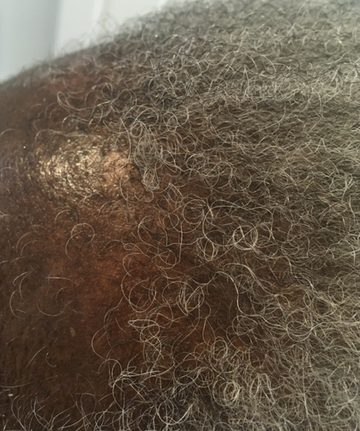
What is causing my itchy scalp?
Itchy scalp is a common complaint in the patients that attend my hair and scalp clinic. When I evaluate patients for itchy scalp, there are a broad range of things I need to consider as possible underlying causes. Today I want to focus on a condition called lichen planopilaris (LPP).
An unexpected finding...
Let me start by sharing the story of an 87-year-old woman. This lovely lady has had severe itchiness of her scalp for >5 years. She never complained about her problem, as she thought this was a normal part of ageing! I happened to meet this lady for another reason and she told me by chance of her itchy scalp. Upon evaluation, it was clear that she also had hair loss involving the frontal scalp region, as well as her eyebrows.
The overall clinical picture was typical for lichen planopilaris (LPP), specifically the frontal fibrosing alopecia subtype.
What is lichen planopilaris (LPP)?
LPP is a chronic inflammatory disease of hair follicles. T lymphocytes (part of our white blood cells) attack these hair follicles, and this results in permanent hair loss and scarring.
This condition can affect both males and females, although it is more frequent in females. Typically, it occurs in middle-aged adults, although younger and/or older individuals may also be affected.
How does it present?
Individuals with LPP can present with an itchy scalp, as well as tenderness and burning sensation of the scalp. There is also hair loss. The hair loss may occur in specific patterns, including a receding frontal hair line, as was seen in this elderly lady. There may be involvement of other hair bearing sites-loss of eyebrows, eyelashes, body hair; skin changes-with bumps on the face, skin rashes or darkening of the face and/or neck, as well as mouth and genitals ulcers and nail changes.
How is the condition diagnosed?
As with any medical condition, diagnosis can be made from a person’s history and examination. We can also use an instrument called a dermatoscope to examine the scalp. This magnifies the scalp and provides illumination, allowing for a closer inspection of the hair follicles. A small skin sample may also be taken from the scalp (biopsy), and then examined under the microscope.
How is LPP treated?
It is important to clarify the goal of treatment. Typically it is to alleviate symptoms such as itching and/or scalp tenderness, as well as to stop the progression of the hair loss. Broadly speaking, anti-inflammatory agents are a key aspect of management. These may be topical and/or systemic.
Topical anti-inflammatory agents includes topical steroids, innjections of steroids into affected sites or the topical use of a group of drugs called calcineurin inhibitors (e.g. Protopic 0.1%).
Examples of systemic agents includes, short courses of oral steroids, hydroxychloroquine, azathioprine, cyclosporin, methotrexate, tetracyclines, isotretinoin, acitretin, anti-androgens such as dutasteride/finasteride.
Various techniques can also be used to camouflage the hair loss.
Seeking support via support groups, such as Scarring Alopecia Foundation and Alopecia UK should also be of help.
Above all, a Dermatologist with a specialist interest in hair and scalp disorders, will be able to make the diagnosis and plan suitable management.
Final take home message
Don't ignore your itchy scalp!




